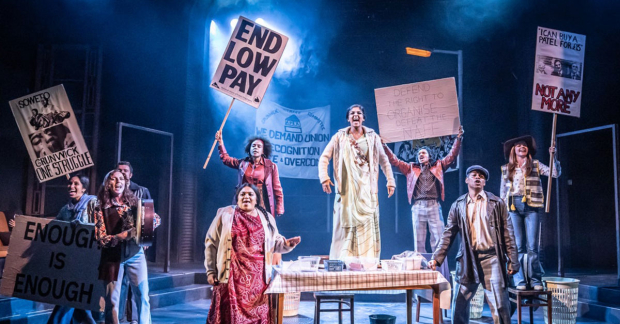NW Trilogy at the Kiln Theatre – review

© Marc Brenner
There are three plays in this portmanteau evening, telling stories drawn from the area of North-west London in which the Kiln theatre is based. Two are absolute diamonds, perfection evocations of life and love; one is a fascinating exploration of a famous historical event. All are absolutely engrossing.
Three excellent playwrights – Moira Buffini, Roy Williams and Suhayla El-Bushra – have provided pieces that are skilfully staged by two directors, Taio Lawson and Susie McKenna. Sadeysa Greenaway-Bailey has designed a semi-permanent set, with a distant block of flats, and dominant red phone box, where the action fluidly moves from the '60s to 1976, and through three different communities whose migration into Brent give the area its diverse history.
All are further linked by a rich soundscape by Ben and Max Ringham and by a sense that music – and dance – can often penetrate the heart of relationships in way in which words never can. Each play contains a musical sequence, and the action is linked by recorded music, creating a thread of emotion that binds the disparate elements together.
Buffini's Dance Floor makes this theme explicit. It's set in an Irish dance hall in Cricklewood in the 1960s, where a naïve young Irish girl Aoife is trying to impress the older Katie (Aoife McMahon) with her mopping skills after a ceilidh the night before. "You can do the Gents first and get them out of the way, or build up your mental armour. Find your own order – but go in there fully fortified," Katie advises, in one of many sharp, humorous lines.
In a sensitive performance from Claire Keenan, Aoife is both innocent and bold, desperate for a job and in the grip of a crisis which has driven her from Ireland. A ring lost and then later reclaimed by the roistering Sean (Emmet Byrne) provides one element of the plot; Katie's relationship with her mixed raced daughter Veronica (Harmony Rose Bremner), a girl with the chance of the education she never had, adds another layer. You feel you could watch these characters, beautifully inhabited by all the performers, for hours but brevity lends the piece poetry.
Williams also compresses a huge amount of emotion and story into a tiny space. Inspired by the history of the label Trojan Records, his Life of Riley takes the form of an encounter between Riley, a reggae guitarist who counts the best days of his life the ones where he accompanied Bob Marley, with his long-lost daughter Paulette who lives with her white mother in Amersham and hasn't had a relationship with her father since he left the family home when she was three.
The writing delicately captures her terrible feelings of abandonment and loss, her longing to make contact, to make sense of her life. With her arms folded, face full of agony, gestures awkward and ungainly, Bremner registers every beat of Paulette's difficulties in reaching out to her father, whom Chris Tummings imbues with his own brand of sorrow and defiance. Their dialogue is both funny and touching, and their encounter is tinged with hope as well as revealing chasms of despair.
Another theme that gently unites the evening is the promises and failures of education for children from a migrant background. The final play, El-Bushra's Waking, Walking which focuses on an East African Asian family caught up in the 1976 strike at the film processing plant Grunwick, opens with the daughter Meera and her Irish friend Niamh failing to do their homework because they are too busy dancing to punk.
The play struggles slightly to contain its many thoughts as well as properly describe the importance of the strike, but it does beautifully convey the many pressures on its heroine Anjali (superb Natasha Jayetileke) as she struggles to obey her husband, support her family and follow her own heart. Like all the plays, which were inspired by an oral history project, it takes life and makes it into a drama, shining a light on different stories which for all their specificity also reveal universal truths.










